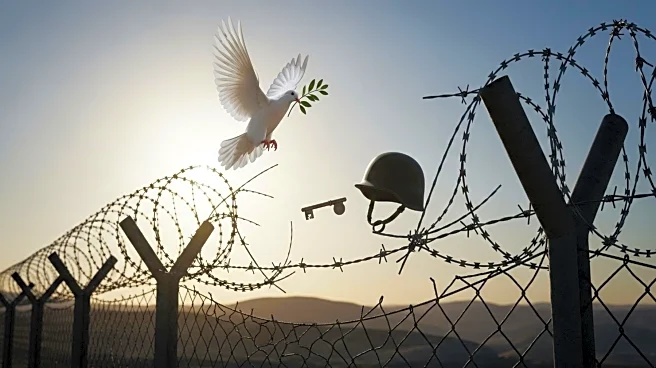What is the story about?
What's Happening?
A cease-fire agreement between Israel and Hamas is taking shape, with plans for a hostage-prisoner exchange and partial Israeli troop withdrawal. The agreement, brokered by President Trump, aims to end two years of conflict in Gaza. While details remain unclear, the reopening of the Rafah crossing from Egypt is expected to facilitate aid delivery. Israeli Prime Minister Benjamin Netanyahu is seeking cabinet approval, despite opposition from hard-right ministers. The agreement is seen as a significant step towards peace, though governance issues in Gaza remain unresolved.
Why It's Important?
The cease-fire agreement represents a crucial development in the Israeli-Palestinian conflict, potentially alleviating humanitarian suffering and fostering regional stability. The deal's success could enhance President Trump's diplomatic legacy, influencing U.S. foreign policy in the Middle East. The agreement also highlights the complexities of regional politics, with implications for future peace negotiations. The reopening of the Rafah crossing is expected to improve living conditions in Gaza, addressing urgent humanitarian needs.
What's Next?
Further negotiations are anticipated to address unresolved issues, including the governance of Gaza and long-term peace strategies. The success of the cease-fire agreement could pave the way for broader discussions on Middle Eastern diplomacy, potentially leading to a two-state solution. International stakeholders are expected to monitor the situation closely, ensuring compliance with the terms of the deal. The agreement's implementation will require cooperation from regional actors, including Egypt and Qatar.
Beyond the Headlines
The agreement underscores the geopolitical dynamics in the Middle East, where longstanding rivalries and alliances play a crucial role in peace negotiations. The involvement of international organizations reflects a shift towards collaborative efforts in addressing shared challenges. The deal also raises questions about the future role of the U.S. in mediating conflicts and supporting post-war reconstruction efforts.















